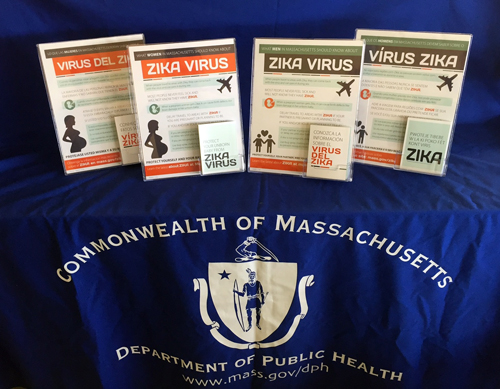Features from the Front Line: Massachusetts
Spotlight on Massachusetts Department of Public Health

The Massachusetts Department of Public Health developed educational materials in English, Spanish, Portuguese, and Haitian-Creole for women and men travelling to areas with risk of Zika virus.
Zika Reporting through Data Integration
In Massachusetts, the first state to report Zika data to CDC’s US Zika Pregnancy Registry (USZPR), 40% of all calls placed to the Department of Public Health’s Infectious Disease Epidemiology Program in 2016 concerned Zika virus infection (Zika). Massachusetts, the third most densely populated state in the country, has long had an active birth defects surveillance system, but the system was not set-up to quickly confirm cases of birth defects linked with Zika.
Accessing Medical Records Remotely
The state’s Birth Defects and Infectious Disease teams worked to get remote access to electronic records in health facilities that had electronic systems so they could have faster access to patient records. This improved access has reduced the amount of time staff spend traveling to and from hospitals looking for information on birth defects cases and babies born to mothers with evidence of Zika infection during pregnancy.
Integrating Two Standalone Data Systems
Both teams were already collecting case information through two standalone systems. However, as the risk of Zika-related congenital defects in babies began to emerge, the need for both groups to share information and access all relevant data in one place became critical. The effort to integrate the two systems began in spring 2016, with the new system going live in May 2017. Zika funding has increased abstractors’ time and allowed the state to prioritize these birth defects for abstraction from the birth defects monitoring program. They say abstraction turnaround times have improved from 2015 to 2016 and are ahead of national standards that give states two years to report final data.
“The average number of days between delivery of an infant with a Zika-related birth defect and our first data abstraction for that infant has gone down by 66 days when comparing 2015 deliveries to 2016 deliveries,” says Mahsa Yazdy, PhD, MPH, director of the Massachusetts Center for Birth Defects Research and Prevention in the Bureau of Family Health and Nutrition.
Building Capacity with CDC Funding
The Epidemiology and Laboratory Capacity for Infectious Diseases Cooperative Agreement (ELC) helped implement USZPR activities and rapidly establish laboratory testing capacity for Zika at the State Public Health Laboratory. Most public health labs can do the initial testing for Zika, but Massachusetts is one of only five states that can also do confirmatory PRNT testing. Funding from CDC’s National Center on Birth Defects and Developmental Disabilities (NCBDDD) complemented these efforts by implementing rapid population-based surveillance of birth defects potentially related to Zika. “The funding has been essential for us because it supports a full-time position that is 100% devoted to coordinating our Zika surveillance efforts,” says Yazdy. “It’s also allowed us to identify areas where we need more support. We have also worked on setting up a Zika advisory committee and the lab has done an outreach campaign with our partners.”
State officials agree that having a history of collaboration has allowed them to best take advantage of additional funds to jumpstart how to work more strategically together and scale their Zika efforts.
“We had a strong foundation but getting additional resources allowed us to leverage and improve our capacity to respond to Zika and collaborate with each other in a very integrated way,” says Catherine Brown, DVM, MSc, MPH, deputy state epidemiologist and state public health veterinarian for the Massachusetts Department of Public Health.